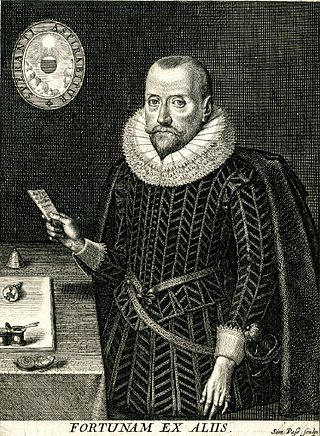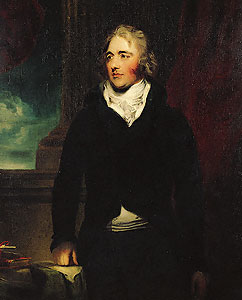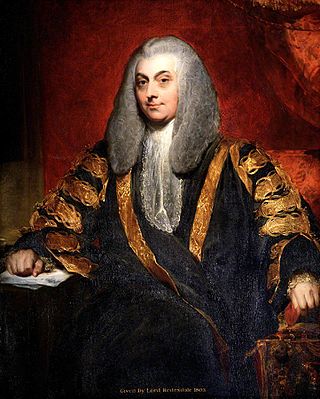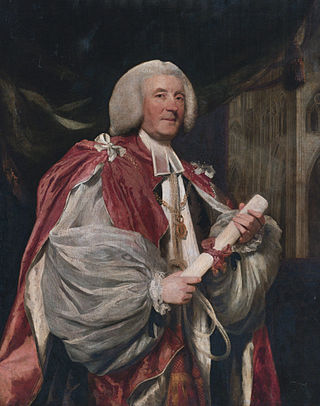Related Research Articles

Gilbert Elliot-Murray-Kynynmound, 1st Earl of Minto,, known as Sir Gilbert Elliott, 4th Baronet until 1797, and the Lord Minto from 1797 to 1813, was a British diplomat and politician who sat in the House of Commons between 1776 and 1795. He was viceroy of the short-lived Anglo-Corsican Kingdom from 1794 to 1796 and went on to become Governor-General of India between July 1807 and 1813.

Sir Robert Naunton was an English writer and politician who sat in the House of Commons at various times between 1606 and 1626.

Charles Stanhope, 3rd Earl Stanhope, aka Charles Mahon, 3rd Earl Stanhope, FRS, was a British statesman, inventor, and scientist. He was the father of Lady Hester Stanhope and brother-in-law of William Pitt the Younger. He is sometimes confused with an exact contemporary of his, Charles Stanhope, 3rd Earl of Harrington.

Robert Hobart, 4th Earl of Buckinghamshire,, styled Lord Hobart from 1798 to 1804, was a British Tory politician.

Charles Jenkinson, 1st Earl of Liverpool, PC, known as Lord Hawkesbury between 1786 and 1796, was a British statesman. He was the father of Prime Minister Robert Jenkinson, 2nd Earl of Liverpool.

John Freeman-Mitford, 1st Baron Redesdale, PC, KC, FRS, known as Sir John Mitford between 1793 and 1802, was an English lawyer and politician. He was Speaker of the House of Commons between 1801 and 1802 and Lord Chancellor of Ireland between 1802 and 1806.

James Harris, 1st Earl of Malmesbury, was an English diplomat.

Sir Theodore Martin was a Scottish poet, biographer, and translator.

Sir Nathaniel William Wraxall, 1st Baronet was an English author and politician.

William Eden, 1st Baron Auckland, PC (Ire), FRS was a British diplomat and politician who sat in the House of Commons from 1774 to 1793.
William Yates Peel was a British Tory politician.

William Faithorne, often "the Elder", was an English painter and engraver.
Michael Angelo Taylor was an English politician and MP for Poole. He favored parliamentary reform and was made a privy councillor in 1831.
Robert Ker, 1st Earl of Roxburghe was a Scottish nobleman.

Sir Jonathan Trelawny, 3rd Baronet was Bishop of Bristol, Bishop of Exeter and Bishop of Winchester. Trelawny is best known for his role in the events leading up to the Glorious Revolution which are sometimes believed to be referenced in the Cornish anthem "The Song of the Western Men".

Thomas M'Crie was a Scottish biographer and ecclesiastical historian, writer, and preacher born in the town of Duns, and educated at the University of Edinburgh. He became the leading minister of the Original Secession Church. His work: "Life of Knox" (1813) was a means of vindicating the Scottish reformer John Knox who was a unpopular figure at the time. It was followed by a "Life of Andrew Melville" (1819). Melville was Knox's successor as the leader of the Reformers in Scotland. M'Crie also published histories of the Reformation in Italy and Spain. He received an honorary degree of D.D. in 1813, the first Secession minister to receive such an award.

Lieutenant-General Sir Robert Murray Keith KCB PC FRSE was a British soldier, diplomat and politician who sat in the House of Commons from 1775 to 1780.

John Thomas was an English churchman, Bishop of Rochester from 1774.
Sir Thomas Baring, 2nd Baronet, was a British banker and Member of Parliament.

William Keith, 4th Earl Marischal was a Scottish nobleman and politician.
References
- ↑ Chisholm 1911.
- ↑ Thomas Campbell, ed. New monthly magazine, vol. 85, p. 433
- This article incorporates text from a publication now in the public domain : Chisholm, Hugh, ed. (1911). "Keith s.v. Robert Keith". Encyclopædia Britannica . Vol. 15 (11th ed.). Cambridge University Press. p. 716.
- Eagles, R. D. E. "Keith, Robert (c.1697–1774)". Oxford Dictionary of National Biography (online ed.). Oxford University Press. doi:10.1093/ref:odnb/15271.(Subscription or UK public library membership required.). The first edition of this text is available at Wikisource: . Dictionary of National Biography . London: Smith, Elder & Co. 1885–1900.